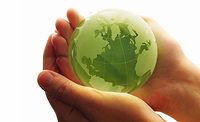Striving for Sustainability
How Are Adhesive Innovations Enabling the Circular Packaging Economy?
The packaging industry can address the growing market demand for sustainable packaging while also enabling operating and performance improvements that have benefits independent from sustainability.

The pandemic drove increased demand for packaging and created significant stresses on the packaging value chain, but it didn’t reduce the focus on sustainability. The industry has had to meet the various challenges of the pandemic while continuing to make progress toward a circular packaging economy.
In fact, continuing to produce innovations that enhance packaging sustainability, expanding capacity, and fortifying supply chains are all proving to be necessary to ensuring the long-term growth and success of the industry. Sustainability is not only a driver of growth for forward-thinking organizations, it also enables more efficient and cost-effective growth.
Avery Dennison has responded to growth in adhesive and label demand with a series of investments designed to expand our adhesive and coating capacity and increase the operational efficiency and agility of our finishing network. Simultaneously, we’ve strengthened our commitment to sustainability through our 2030 sustainability goals, which include delivering innovations that advance the circular economy and reducing the environmental impact of our operations and supply chain. The investments and sustainability goals ultimately work together to support the long-term health of the organization.
Brands and converters can take a similar approach. By adopting new, more sustainable packaging solutions, they address the growing market demand for sustainable packaging while also enabling operating and performance improvements that have benefits independent from sustainability.
Bio-Based Adhesives
One of the most exciting developments of 2021 was the launch of bio-certified hot-melt adhesives. While there were some bio-based adhesives available on the market prior to 2021, they were often limited to niche applications. The introduction of bio-based and certified hot melts creates the opportunity to expand the use of these environmentally friendly materials to a broader range of applications.
The new hot melts displace a significant percentage of the petroleum-based material in the adhesive with renewable, agricultural resources. The USDA BioPreferred Certification program validates the bio-based content of these adhesives through third-party testing. Certified products can promote their bio-based content on product labels, providing consumers with the sustainability information they are looking for when selecting products.
What’s especially exciting about this new generation of adhesives is that they don’t compromise performance to achieve sustainability goals. In fact, they offer enhanced performance compared to previous generations of hot-melt adhesives.
They’re effective across a broad temperature range and experience lower levels of adhesive contamination and ooze than hot melts with a higher percentage of petroleum-based material. This allows converters to run presses more efficiently without compromising speed, conversion, or dispensing. They also offer high tack and eliminate the bleed that contributed to an oily appearance on finished labels with previous-generation hot melts. In short, converters get increased operating efficiency and brands get more sustainable packaging with benefits that can be credibly communicated to consumers.
Enhancing Recyclability
Discarded polyethylene terephthalate (PET) bottles have become a symbol of the lack of a circular economy in packaging, and the industry must continue to take steps to increase the percent of PET that is effectively recycled. One barrier that has hindered PET recycling in the past was label contamination. When labels don’t separate cleanly from the plastic in the recycling process, label residue gets mixed with the recycled plastic and makes it unusable. Newer water-based adhesives can be employed to overcome this barrier and increase the percent of PET that is recycled.*
These water-based adhesives create a strong bond with the PET bottle to ensure adhesion throughout the product lifecycle. When placed in the sink/float process at the recycler, however, the cohesive bond is broken and the face stock and adhesive separate from the PET flake, resulting in pure rPET flakes that can be used in a range of products.
The newest generation of all-temperature emulsion adhesives is fully repulpable to enable paper labels to remain on corrugated packaging that is recycled.** These adhesives also use fewer chemicals and less water in production, minimizing their environmental impact. Like the newer generation of hot-melt adhesives, they reduce ooze to enable higher efficiency for converters.
Advancing Efficiency and Effectiveness
It can be easy to overlook adhesives when developing plans to improve sustainability, but they play a vital role in enabling operational efficiency and effective recycling. They are also continuing to benefit from innovations that incorporate more sustainable materials in ways that improve performance.
Now is not the time for brands and converters to take their foot off the gas in driving toward a circular packaging economy. The current generation of adhesives includes multiple solutions to help brands and converters achieve their sustainability goals, and Avery Dennison is committed to continuing to introduce new solutions that advance the circular economy.
For more information, visit https://label.averydennison.com.
*Such as Avery Dennison CleanFlake **Such as Avery Dennison TrueCut
Note: Opening image courtesy of Avery Dennison.
Looking for a reprint of this article?
From high-res PDFs to custom plaques, order your copy today!





